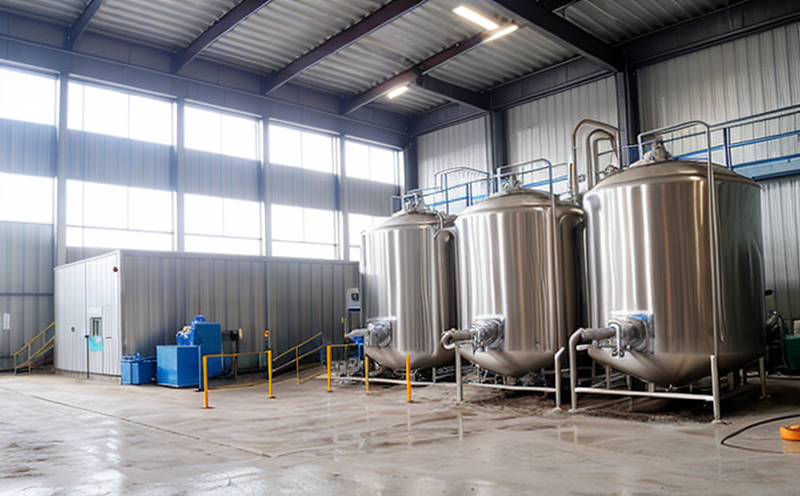ASTM D5088 Total Recoverable Hydrocarbons Test in Process Water
The ASTM D5088 method is a widely recognized standard used to determine total recoverable hydrocarbons (TRH) in process water. This test measures the amount of volatile and non-volatile organic compounds that can be extracted from the water sample using hexane as an extraction solvent.
Water quality is critical for industrial processes, particularly those involving chemical reactions or heat transfer. Hydrocarbon contamination in process water can lead to various issues such as fouling of equipment, reduced efficiency, and even safety hazards. By ensuring that the total recoverable hydrocarbons are within specified limits, industries can maintain optimal operating conditions and comply with environmental regulations.
The ASTM D5088 test is applicable to a wide range of industrial sectors including oil refining, petrochemicals, pharmaceuticals, and food processing. The method provides a reliable means to monitor the integrity of water treatment systems and ensure that the water used in these processes meets quality standards.
For quality managers and compliance officers, understanding the nuances of ASTM D5088 is crucial for maintaining process efficiency and environmental responsibility. This test helps in identifying potential sources of contamination early on, allowing for timely corrective actions to be taken. For R&D engineers and procurement teams, it ensures that the right water treatment technologies are selected and implemented, leading to more sustainable processes.
The ASTM D5088 method involves several steps: sample preparation, extraction with hexane, drying the extract under nitrogen flow, and finally measuring the volume of the extracted hydrocarbons. The accuracy of this test is paramount as even small amounts of TRH can have significant impacts on process outcomes.
It's important to note that while ASTM D5088 provides a robust method for determining total recoverable hydrocarbons, it does not address all aspects of water quality. Other tests may be required depending on the specific needs and regulatory requirements of an industry.
Understanding the intricacies of this test can help stakeholders make informed decisions about their water management strategies. By adhering to international standards like ASTM D5088, industries can demonstrate their commitment to environmental stewardship and operational excellence.
Why It Matters
The significance of the ASTM D5088 test in process water cannot be overstated. Hydrocarbon contamination, even at low levels, can lead to serious consequences for industrial processes. For instance, fouling of heat exchangers or chemical reactors can result in increased energy consumption and reduced production efficiency. In extreme cases, it could necessitate costly shutdowns and repairs.
Moreover, hydrocarbons can pose significant safety risks if not properly managed. They are flammable and volatile, which means they can contribute to hazardous working environments. By conducting regular ASTM D5088 tests, industries can proactively manage these risks, ensuring a safer work environment for employees.
The test also plays a crucial role in compliance with environmental regulations. Many regions have stringent laws regarding the discharge of contaminated water into natural ecosystems. Ensuring that process water meets all relevant standards helps companies avoid hefty fines and reputational damage. Additionally, it supports their commitment to sustainable practices, which is increasingly important for maintaining consumer trust.
On a more positive note, adhering to ASTM D5088 can also lead to operational improvements. By identifying sources of hydrocarbon contamination early on, industries can implement targeted interventions to prevent further issues. This not only enhances process efficiency but also contributes positively to the environment by reducing waste and pollution.
In summary, the ASTM D5088 test is essential for maintaining water quality in industrial processes. It helps identify potential problems, ensure compliance with regulations, enhance safety, and improve overall operational performance.
Why Choose This Test
- Comprehensive Coverage: The ASTM D5088 method provides a comprehensive assessment of total recoverable hydrocarbons in process water, covering both volatile and non-volatile organic compounds.
- Regulatory Compliance: By adhering to this standard, industries can ensure that their processes meet the stringent requirements set by environmental regulations.
- Safety Assurance: The test helps identify potential safety hazards associated with hydrocarbon contamination in industrial settings.
- Operational Efficiency: Regular testing ensures that process water remains clean and free from contaminants, leading to more efficient operations.
- Environmental Responsibility: Demonstrating adherence to international standards like ASTM D5088 can enhance a company's reputation for environmental stewardship.
The ASTM D5088 test is therefore not just a compliance requirement but also a tool for enhancing operational efficiency, ensuring safety, and promoting environmental responsibility. It provides peace of mind that the water used in critical processes is free from harmful hydrocarbons.





